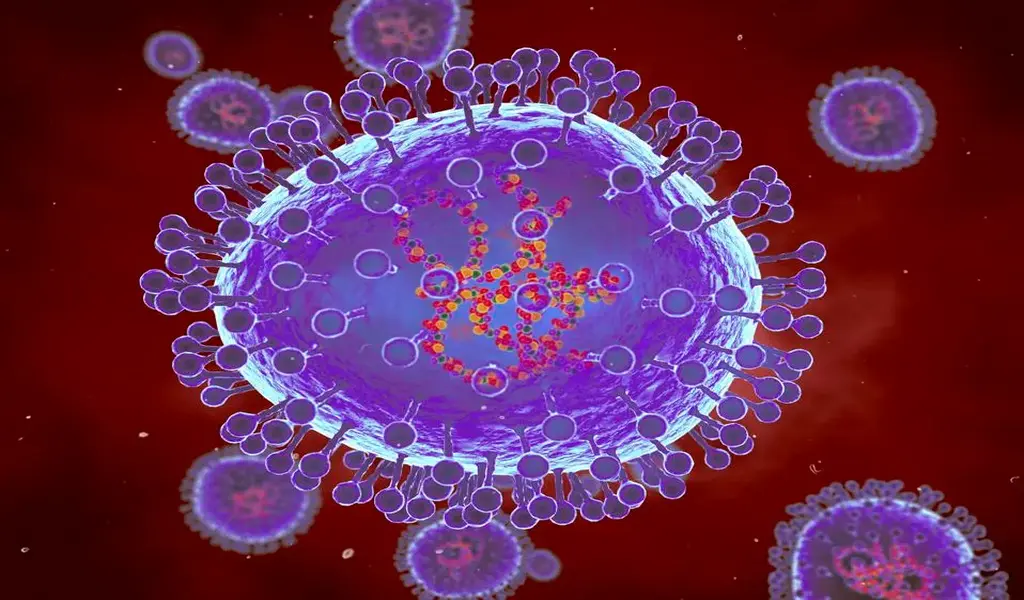Health
According to Doctors, This is The Most Dangerous Virus You’ve Never Heard of HMPV

(CTN News) – The previous winter was particularly bad for respiratory viruses, with RSV, influenza, and Covid-19 outbreaks dominating. But, just as it ended, a little-known virus that causes many of the same symptoms – a lower lung infection, hacking cough, runny nose, sore throat, and fever – was gaining traction.
According to the US Centres for Disease Control and Prevention’s respiratory virus surveillance systems, cases of human metapneumovirus, or HMPV, increased this spring. It overflowed hospital intensive care units with young children and the elderly most vulnerable to severe illnesses. Nearly 11% of tested specimens were positive for HMPV at its peak in mid-March, approximately 36% more than the usual pre-pandemic seasonal peak of 7% test positivity.
However, most people who caught HPV were probably unaware they had it. Outside of a hospital or emergency room, sick patients are rarely screened for it. Unlike Covid-19 and the flu, there is no vaccination or antiviral medication to treat HMPV. Instead, clinicians treat seriously ill patients by addressing their symptoms.
An underestimated threat
According to studies, HMPV causes as much unhappiness in the United States each year as the flu and a closely related virus, RSV. According to one research of patient samples collected over 25 years, it was the second most common cause of respiratory infections in children behind RSV.
Research conducted in New York over four winters discovered that it was as common in hospitalized seniors as RSV and the flu. HMPV, like previous infections, can lead to intensive care and deadly cases of pneumonia in the elderly.
During a family gathering in early April, Diane Davison became infected with human metapneumovirus. She couldn’t chat on the phone for two weeks because she was coughing hard.
“I couldn’t say more than a couple of words,” said Davison, 59, a Baltimore entertainment lawyer. “I’d go into violent, violent coughing fits to the point where I was almost throwing up.”
Her cough was so persistent and deep that she was convinced she had finally caught the coronavirus after avoiding it for the duration of the pandemic. However, she did six quick tests for Covid-19, all of which came back negative.
Davison is immunocompromised, so she has been wary of the pandemic. Concerned about pneumonia, she went to a nearby radiology clinic for an X-ray and was informed it was normal. Her doctor, however, was not satisfied and referred her to an emergency department for additional tests. HMPV was discovered in her blood testing.
“‘What?’ I thought.” Because it sounds pretty bad,” Davison explained. “I’ve never heard of anything like it.”
Dutch virus hunters identified human metapneumovirus in 2001. They had 28 samples from children with unexplained respiratory illnesses in the Netherlands. Some children were critically ill and needed mechanical ventilation, yet they tested negative for any known pathogens.
The samples were cultivated in several types of cells from monkeys, chickens, and dogs before being examined under an electron microscope. They discovered something that appeared structurally linked to the paramyxoviridae family of viruses known to cause respiratory diseases such as measles, mumps, and respiratory syncytial virus, or RSV.
A detailed examination of the virus’s genome revealed a distant relative: avian metapneumovirus, which infects birds. Human metapneumovirus was the name given to the novel virus. Scientists believe it most likely evolved from birds to humans at some time.
When the researchers analyzed blood samples from 72 individuals stored since 1958, they discovered that they had been exposed to the mysterious virus, indicating that it had been circulating in people undetected for at least the past half-century.
Doctors and Patients in the Dark
Dr. John Williams, a pediatrician at the University of Pittsburgh who has spent his career researching vaccines and treatments for HMPV, says scientists don’t know what causes a lot of respiratory infections, which are the leading cause of child deaths worldwide and the top reason for hospitalization in the US.
Williams notes there were large epidemiological studies on respiratory diseases in the 1950s and ’60s. They only identified viruses in patients roughly half the time. “OK, what about that other half?” he continued. Human metapneumovirus accounts for roughly as many undiscovered viruses as RSV or influenza.
It’s unknown. “The most important virus you’ve never heard of,” says Williams. “Those three major viruses,” he continued. “Those are the big three in kids and adults, the most likely to hospitalise and cause severe disease, most likely to sweep through nursing homes and make older people sick and even kill them.”
HMPV testing is rarely done outside hospitals, making it difficult to estimate its full burden. Blood testing shows most kids have it by 5. A 2020 Lancet Global Health study predicted that 14 million children under 5 had HMPV infections in 2018, 600,000 hospitalizations, and 16,000 fatalities.
Related CTN News:
World Multiple Sclerosis Day: Warning Signs, Symptoms, And More





























